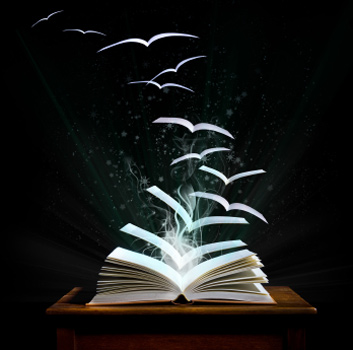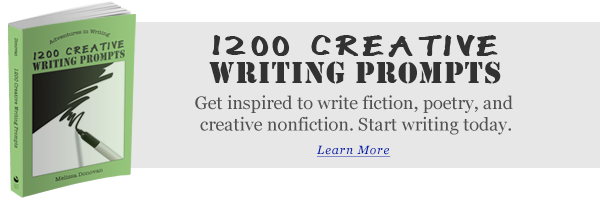A good book is a writer’s paradise. At least, it should be.
A book can be an adventure. It can show us the world from a new perspective. It can be a mirror, a microscope, or a telescope. It can reflect the world, magnify it, or carry us away to far-off places.
Books are extra special for writers. They entertain, inform, and inspire us. More importantly, they teach us our craft.
Journal Prompts
Lots of bookworms keep reading journals. A reading journal is perfect for a writer, especially a fiction writer, because it provides a place where you can write about what you’ve read and explore it in depth.
Why is this important? Why not just read a book, try to learn from it, and then move on to the next one?
When we take the time to write about something, we are forced to think clearly and critically. The process of writing about what you’ve read will help you understand the text more deeply.
You could simply write a review about whether you loved or disliked a book and why. You could also write a synopsis, rehashing the story in your own words. These are useful exercises (and you can, of course, use them any number of ways — such as publishing your reviews on Amazon or Goodreads to help your fellow readers and writers).
Or you could dig in, deconstruct the work, analyze it, and extract new techniques that you can apply to your own writing projects.
Journal Prompts
These journal prompts encourage you to examine what you’ve read from a writer’s perspective. You can explore these in your journal to better understand what makes a story work. Choose the prompts that deal with areas of writing that you’re struggling with. Use them over and over with different books you read and learn something new every time.
- How did the book make you feel? Were you sad? Scared? Intrigued?
- What was it about the book that evoked an emotional response from you? Was it the characters? The plot?
- Did you feel like an observer, or were you pulled into the story, more like a participant?
- How did the author build tension? Write down each pinnacle or event that led to the final climax.
- Was the book a page-turner? What were the hooks or cliffhangers that made you want to keep reading?
- What was uniquely likable about the protagonist? What made the antagonist bothersome or despicable?
- How would you describe the tone of the narration? Was the prose flowery? Sharp? Poetic?
- Take a look at the cover. Did it make you want to read the book? How does it represent the book and/or compel readers? Notice the font used for the title and author’s name. Notice the placement.
- How was the book structured? Did it have chapters? Were they numbered or named? Was there an introduction, a prologue, or an epilogue? A table of contents? To whom was the book dedicated? Who did the author thank in the acknowledgments?
You can also use these questions to better understand storytelling in films, television shows, and other mediums.
As writers, we can learn a lot by reading books thoughtfully and closely and by contemplating them as we’re reading and again when we’ve finished reading. You can always use these journal prompts after you’ve read a book (especially a good book); you don’t have to write out your answers in your journal but doing so will likely reveal many details that you otherwise wouldn’t have noticed.
Do you read with a writer’s eye? Have you ever kept a reading journal? Do you consider yourself a bookworm? Finally, if you use any of these journal prompts to explore a book you’ve read, tell us how the experience helped you see the story in a clearer light. Share your thoughts by leaving a comment, and keep reading!






Hi Melissa, Thanks for this great idea – a reader’s journal. Although I do try to learn whatever I can about the craft in each book I read, I’ve never thought to keep a reader’s journal which, as you say, could force me to delve deeper into the book’s mysteries. I think I’ll give it a try.
Margaret, I hope you’ll come back and tell us how it worked for you. Good luck!
Fantastic!
I think this is a great idea. The leader of my writer’s group is always commenting about books she’s read, and she is very articulate about why she likes it, it’s strengths and so on. It makes me realize that, as much as I like reading I rarely retain much of it once I’ve finished. I’m going to try this and see what happens. Great prompts.
Thanks, Rose, and good luck with these prompts. I find it’s hard to slow down and really chew over a novel because I’m in such a hurry to read the next one. Hopefully these will help me (and others) slow down and retain more of what we’ve read.
I’ve always loved reading; because of this I am inspired to be a writer. I’ve never kept a reading journal though, and by the time I get on with the next book I tend to forget my thoughts and feelings about the previous one I’ve read. Thank you for sharing this, from now on I’m going to keep a reading journal. This will surely give me some nice ideas in creating my own stuff.
That’s awesome. I hope you’ll come back and tell us about your reading journal and how it influences your writing. Good luck!
Several years ago I bought a notebook and customized it for my own reading journal. I got the idea after seeing reading journals for purchase at the bookstore. I’ve recorded each book I’ve read and have written down excerpts that spoke to me so boldly. It’s interesting to go back and chose one of these to journal about more indepth, to understand my reactions. These journal prompts will be great! Thank you! My reading journal is titled “She found herself in books”.
Hi Lori. I love the name of your reading journal. That’s lovely.
Thanks for this entry! it’s just the poke I needed. For the last few years I’ve been scribbling notes whenever I read books for my book club, but these make up only five per cent or so of my yearly reading total. I’ve often thought of starting a reader’s journal, even going so far as to buy a rather delightful red moleskine for the purpose, which currently sits unused on my desk, glaring reproachfully at me whenever I unearth it from under the stacks of paper I keep piling on top of it.
Reading makes the writer, there’s no doubt about that, and critical reading, I’m sure, makes an even finer writer.
Off I go to unearth my pretty little journal.
Reading definitely makes the writer! One simply cannot read enough. Thanks, Kern!
Great tips for summer reading. I’m taking my first fiction writing class in the fall and I need all of the help I can get!
Thanks for your kind words, Brooke.